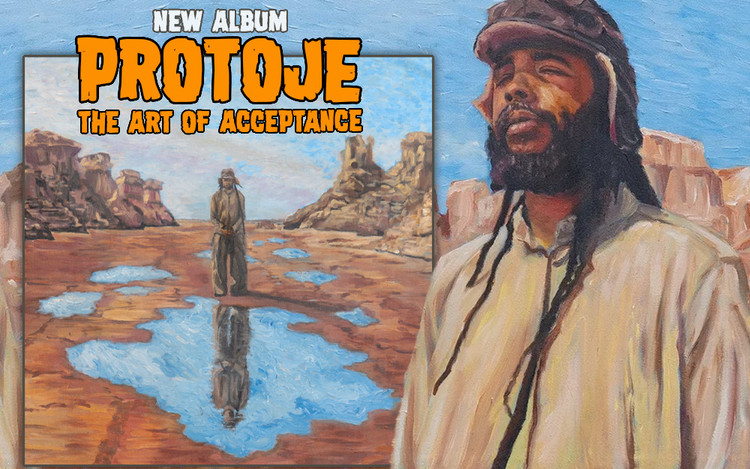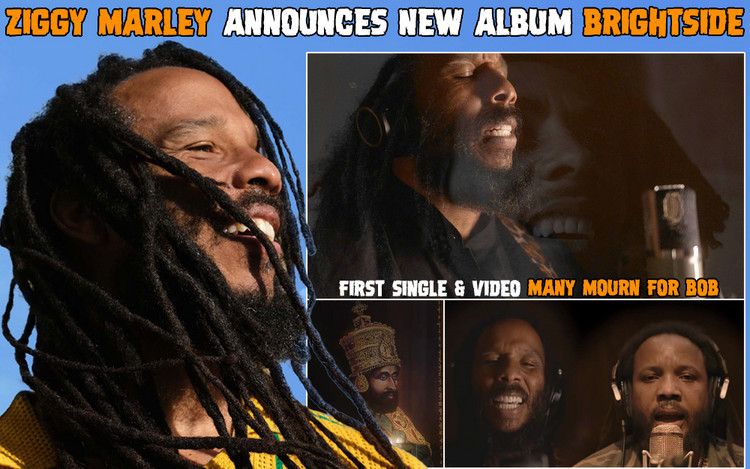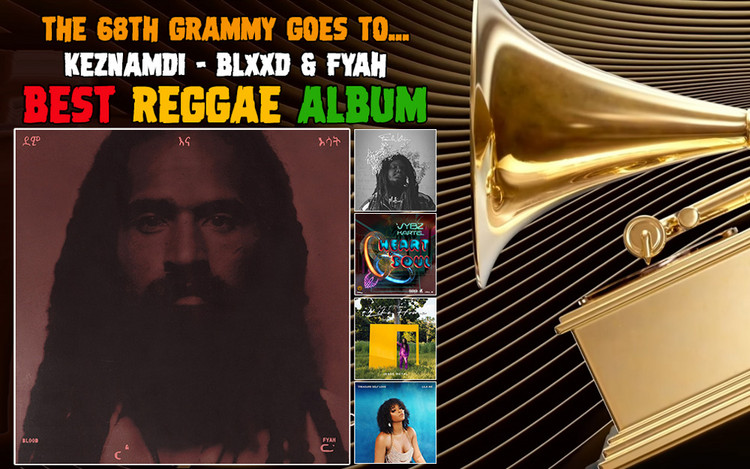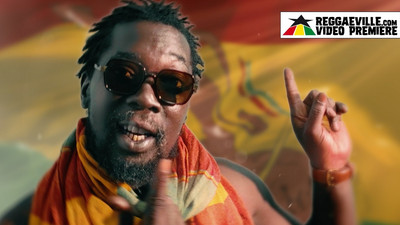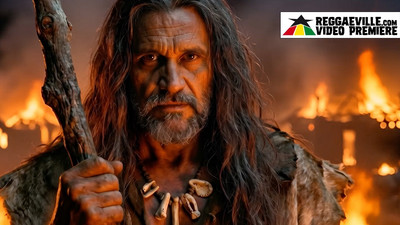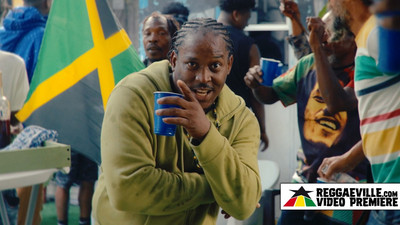Cimarons ADD
Cimarons Interview Part I - Forming The Group & Visiting Africa
07/13/2025 by Angus Taylor
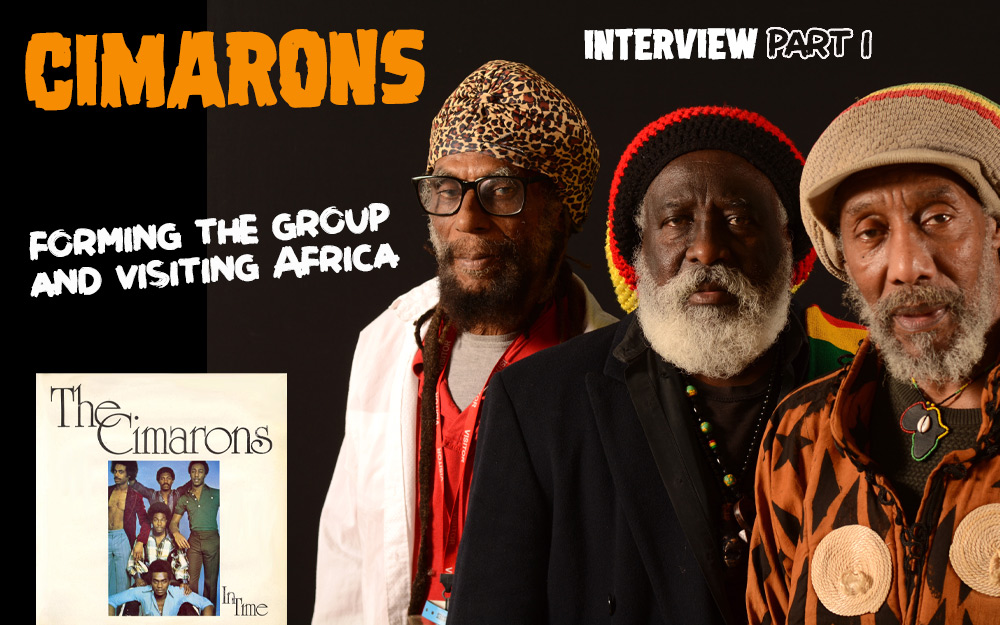
The eldest child in a family often has it the hardest. They set the path their younger siblings can follow - without support and acknowledgement for the lonely trail they've blazed.
This analogy can be applied to foundation UK reggae group Cimarons. Britain’s first reggae band, they were formed in Harlesden, North West London in 1967 by guitarist Locksley Gichie and bassist Franklyn Dunn, along with drummer Maurice Ellis and keyboardist Carl Levy. They became the go-to musicians for London - and the wider country’s - burgeoning reggae scene. They recorded hundreds of sessions uncredited using a variety of aliases, which are still being unearthed as their work today, and seven albums under their own name.
They were the first reggae band to embark on a precarious tour of West Africa, and to reach Ireland, Japan and Thailand in the early 70s. They backed Bob Marley, Pat Kelly, Ken Boothe, Toots and the Maytals and Jimmy Cliff when they came to the UK, and beyond. They appeared at the 1973 Edinburgh Festival with Nicky Thomas and Dennis Alcapone, which was broadcast on the BBC’s Old Grey Whistle Test, and accompanied Ken Boothe on Top Of The Pops in 1974 when he performed Everything I Own.
Their initial lead singer Carl Bert left before completing debut Trojan LP In Time, and was replaced by Winston Reedy, who became their longest serving frontman. In 1975 they had a surprise number one hit in Jamaica with a cover of Bob’s Talking Blues, which led to them recording second album On The Rock at the legendary Channel One, Randy’s and Black Ark studios in Kingston.
But where the next wave of bands they inspired such as Aswad and Steel Pulse went on to lasting international acclaim, Cimarons did not receive adequate recompense or recognition for their pioneering status. They moved from label to label, signing to Polydor for 1978’s psychedelic rock infused album Maka, then to Virgin for 1980’s Freedom Street. 1981’s Paul and Linda McCartney financed covers collection Reggaebility failed to add up to the sum of its parts commercially. Reedy went solo and the group disbanded due to lack of opportunities.
Yet after a four-decade hiatus, a series of commemorative events encouraged their return. In 2014 their friend Delroy Washington asked Brent Council to honour them with a blue plaque at the Tavistock Hall in Harlesden, the youth club where they formed. During the 2020 covid lockdown, with live music at a low ebb, Gichie, Dunn, Ellis and new singer Michael Arkk participated in a streamed concert as part of Brent’s No Bass Like Home festival.
This sowed the seeds for a 2024 documentary, Harder Than The Rock, directed by Mark Warmington, which told the heartwarming story of the group’s rise, demise and comeback show at Brixton Hootananny (where Reedy joined them on stage). Sadly, Maurice Ellis, and longtime compatriot and guest vocalist/songwriter Bobby Dego Davis, passed away during the making of the film.
In June 2025, the group released an eighth album, also titled Harder Than The Rock. Backed by a top team of Spanish musicians, overseen by maestro producer and seal of quality Roberto Sanchez, it revisits old and fresh material, standing proudly alongside their best work.

Angus Taylor met Locksley Gichie and Michael Arkk in person at London’s Barbican Arts Centre to hear about the new record and their story. A short version was published in this summer’s Festiville magazine. This longer transcript of their 2-hour plus discussion traces their history and contains many fascinating details: Gichie inspiring the lead guitar on the Wailers’ Concrete Jungle, an unreleased early Cimarons album recorded with Philip Chen, meeting Fela Kuti in Nigeria, and nearly playing on Max Romeo’s War In A Babylon album. They also confirm their involvement in collectors’ reggae 45s such as Jackie Paris’ Make Me Smile, and Soul Messengers’ redo of B.T. Express’ Do It Til You’re Satisfied, and explain why their cover of War’s Slippin Into Darkness got released under a different name.
Part 1 tells of the group’s formation, their trip to Africa and Winston Reedy replacing Carl Bert in the lineup.
Locksley, I want to ask about your history. You were born in Montego Bay St James Parish?
Locksley Gichie: Montego Bay. On St James Street. Just across the road from there. My grand uncle was a printer. He was my dad's uncle. So we were a family of printers. But for me as a small youth growing up in Jamaica music was always there. You were surrounded. Across the road, there was a nightclub on top of the roof. We were close to the port and every weekend the sailors used to come in and let off. So every weekend Friday to Sunday it was boogie, rock and roll, Sam Cooke, Chubby Checker, Fats Domino. It was like a beat in my brain man! And Sea Cruise “Let me take you on a sea cruise”.
Michael Arkk: Blueberry Hill and all of those.
Locksley Gichie: And it would just keep every weekend, the music pounding. So my mum came to England before us and she left us with our grandparents in the country. Me and my sister were always performing. With the other kids around. We used to make those little boxes with the transparent screen and make little figures like a cartoon thing. And we used to entertain all the youths! I used to play on the boxes like I was playing drums. (Drums table) And I used to watch a friend of mine. There are a lot of Rasta youths around and they were very talented and they could make things. I used to watch them make a guitar out of bamboo. Just one sound (strums) that was my first guitar. Out of bamboo.
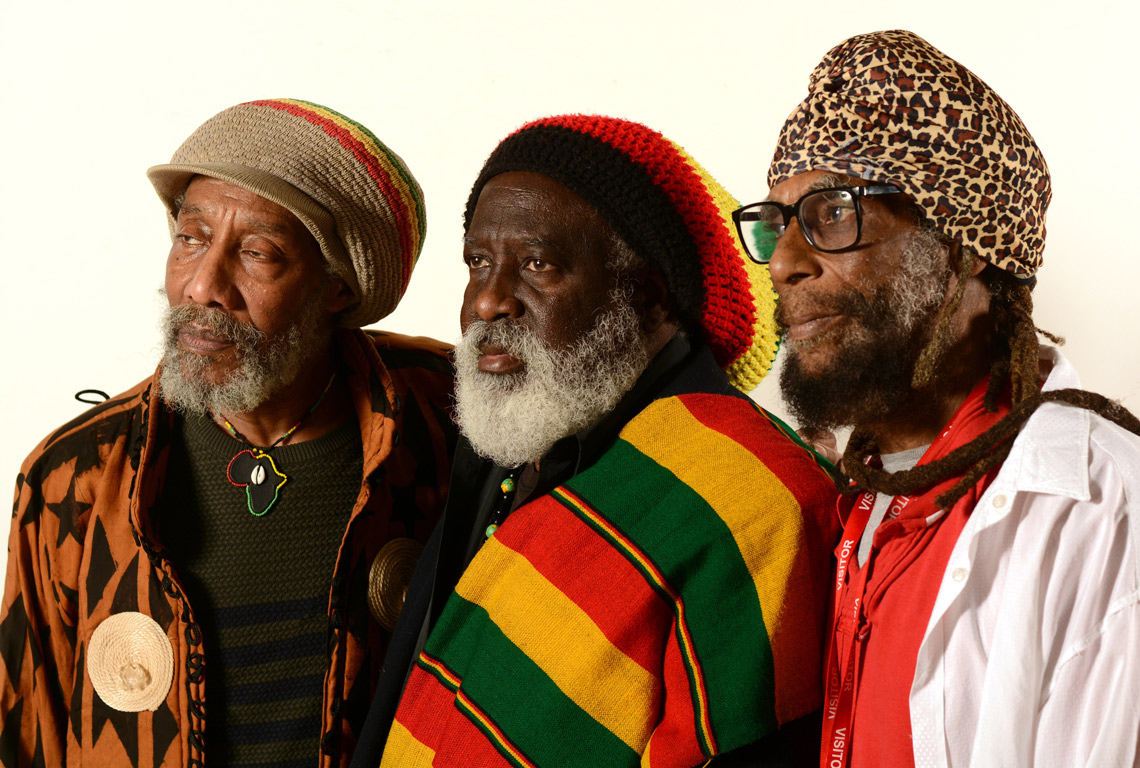
Was there music as well as printing in your family history? Were your parents musical?
Locksley Gichie: My grandfather, he was a riddim. He was always (Drums rhythmically on table) and there were two grandfathers on my mum's side. The second grandfather on my mother's side he was a riddim. He was a rhyme-ist. He could rhyme for hours! A bit of it is there. But he could just make words rhyme and keep on going for hours. So that musical tradition was there. The rhythm part of it.
So you came over in ’62? And this was when Ska was just starting.
Locksley Gichie: Yeah ’62. The ska thing. That was when the vibes got me. From ska days it's like music was just dominant now. Dominant from Jamaica to England. And what made it worse was there was this flat. We were staying in this house with my mum and her friend. She was living upstairs and we were in the downstairs flat. And the house man was a sound system man. The first sound system man. Count Steve. We became good friends. And constantly he was in contact with Jamaica. So every month he would get his box of records from Duke Reid or Coxsone. Because I was a selector so when it comes, he would call me. He'd switch it on and you could hear the valves warming up (Makes sound) and then you'd hear the needle (makes sound of needle), it's calling me! I used to select and he'd say “No man, not that one” or “Yeah man, that one” (laughs) so I was a selector from there. I wanted to do music, man, because I was so captivated. But there was no band around. There was no black band around at that time. So it was like television thing. Dave Clark Five, The Beatles you name it. I used to watch all the pop programmes like Jukebox Jury, Top Of The Pops…
Ready Steady Go.
Locksley Gichie: Ready Steady Go yeah! (laughs) And from then I wanted to do music. From school days, but at school I couldn't find no one who was interested. It was not until I left school now and I was inquiring saying “How come I never see no black band around? There's no black musicians around”. One guy said to me “Yes, there's a group called The Shadrocks. They just won some band contest”. I went looking for them and they were rehearsing in this club in Harlesden called 31 Club. I went in there and saw them rehearsing and the singer was very good. Very entertaining. Little John. I said “Little John, I want to do some singing you know?” And he said “You want to sing?” And I said “Yeah, I want to start singing”. So he said “Buy a guitar and start your own band!” (laughs) I thought “This guy is mad. I want to sing now. I don't want to join a band!”
And then they had a singing contest. I spent weeks and weeks rehearsing My Girl by The Temptations. Weeks and weeks rehearsing that song. And then when the singing contest came along there were only three of us that entered the singing contest. There was one girl called Beverly and funnily enough, Junior English. It was a Friday night and they threw us in at the deep end. I've never worked with a live band before in my life. And they just called you on stage with no rehearsal. And when they started playing My Girl wrong key! (Sings falsetto)
Too high.
Locksley Gichie: (Laughs) too high. It's a disaster. But funnily enough people loved it. Because of the courage. The girl was worse. She froze. Junior English came from Jamaica already and had records to his name. And he smashed it. But they loved me. They said “This guy is good, he's brave you know?” and that was it. It took me quite a while, a couple of months you know? Because I couldn't find anyone to start a group with. So I decided “Oh well, I'll go and buy a guitar”. I went to the shop in Kilburn and they were expensive at the time and I asked the guy who owned the shop Mr Melburn and he went around the back and brought round this acoustic guitar. Well battered! Anyway I bought it. Everything was wrong with it. I didn't know that the strings were too far away from the frets. It was a disaster. I had a guitar but I didn't know what I was doing. I couldn't tune it, nothing at all. So after a couple of months I just put it at the top of the wardrobe. Left it.
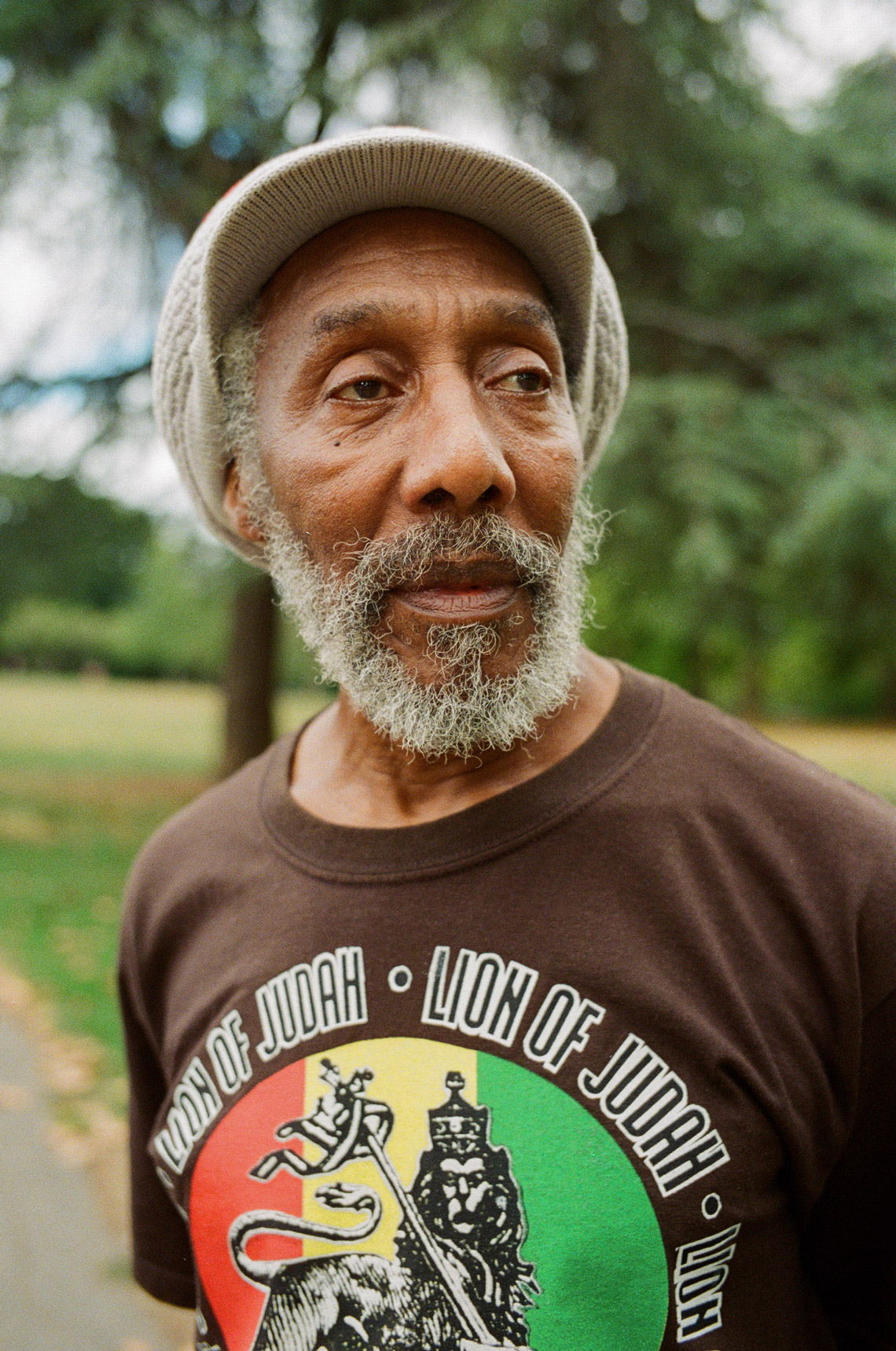
Until a friend of the family came round and said “Is that your guitar? Bring it down here. You can play?” I said “No”. He said “It needs tuning”. I didn't know nothing about tuning. And he showed me the tuned guitar and it was so simple. And he says “You can't do nothing until you can tune the guitar”. So every time I tuned it, he said “No, no” he would turn the string off and say “Start again”. And eventually that was it. He showed me three chords. G, C and D. And he said “Practise the G every day until you can play smoothly. No funny sounds”. And I did it. After a week he showed me how to play C. And I played C, so the next week after he showed me D. By this time now it came naturally. I was surprised that it was coming so easy. And eventually I started playing the three chords. G, C, D.
And this was about the same era now when the rocksteady came. The ska started turning into the rocksteady. And I found it much easier now because it was so natural. And the first song I did on the acoustic guitar was Ride Your Donkey. (They sing together) “When I was just a little my mummy bought a fiddle for me and the only tune that I could play was ride your donkey”. and then I started learning one or two more. Like Slim Smith with Hip Hug. And then My Girl by the Techniques. It was blowing my mind that it was so simple and easy. And it wasn't until a couple of months after now, when I was walking through the High Road one Friday evening very damp and cold and I saw this brother standing under the bus shelter with an acoustic (laughs). I couldn't believe it, you know? I thought “What this guy has a guitar?” I rushed across the road and I said “Yo brother, you can play guitar?” he said “Yeah, I can play the guitar”. “Let me hear you play”. Franklyn couldn't play a thing!
Both: (Laughter)
Locksley Gichie: I said “You can't play, man!” And I started playing a song for him. I started to play Ride Your Donkey. Frank couldn't believe it. Frank said “But that's rocksteady?” I did My Girl and I did Alton Ellis and all the popular songs. Frank couldn't believe it. And luckily round the corner from there was this Tavistock Centre. Behind a Methodist church. Frank says “Come down Friday because every Friday we're down here at the youth centre”.
I went down on Friday evening and it was a very nice youth centre. All the teenagers of our age group were there. And the majority of them were from Jamaica. So it was a meeting spot. And Frank found a little spot at the back of the hall and we started messing around. And Frank said “I want to play bass”. I'm already playing rhythm so he can play bass. But he was a quick learner. It took us a whole night. It took us about three hours for him to learn the bassline of Ride Your Donkey. He did quite well. After three hours he was not too bad. He was a bit shaky and rickety but he got better. In a few weeks time he got better and better.
And that's when Maurice and Levy came in. Levy was the first one who came in. Levy was loud “Yo, yo, I can play piano!” Luckily there was one broken piano in the rooms. We took him there and he started banging away. I don't know how good it sounded but it sounded good to me. A couple of weeks after, Maurice just walked in about two weeks after he came to England. He just happened to walk into the hall and he just sat there listening to us. “I can play drum”. But Maurice had the edge. Because Maurice was coming from the cadets. He used to be a cadet in Jamaica. So he had the edge. He was more advanced than us. Because Maurice used to play the marching drum (Drums rhythmically). And he was so surprising because he was a natural. We gave Maurice a tin and he started to do the one drop. And that was it. And then I started singing because I wanted to be a singer (laughs).
But then as time went on another guitarist joined us called Leslie. And Leslie's girlfriend Faye could sing but she was a soul singer. Leslie was a soul guitarist. He wanted to do the soul man! Leslie wanted to do Booker T and the MGs. He wasn't into reggae. And his girlfriend could sing like Aretha Franklin. And her brother called Mingos was like Otis Redding. It was funny in those days you had people who could sing like these artists. Sound exactly. Because when Mingos sang like Otis Redding (sings) “sitting on the dock of the bay” if you close your eyes you'd think it was Otis singing.
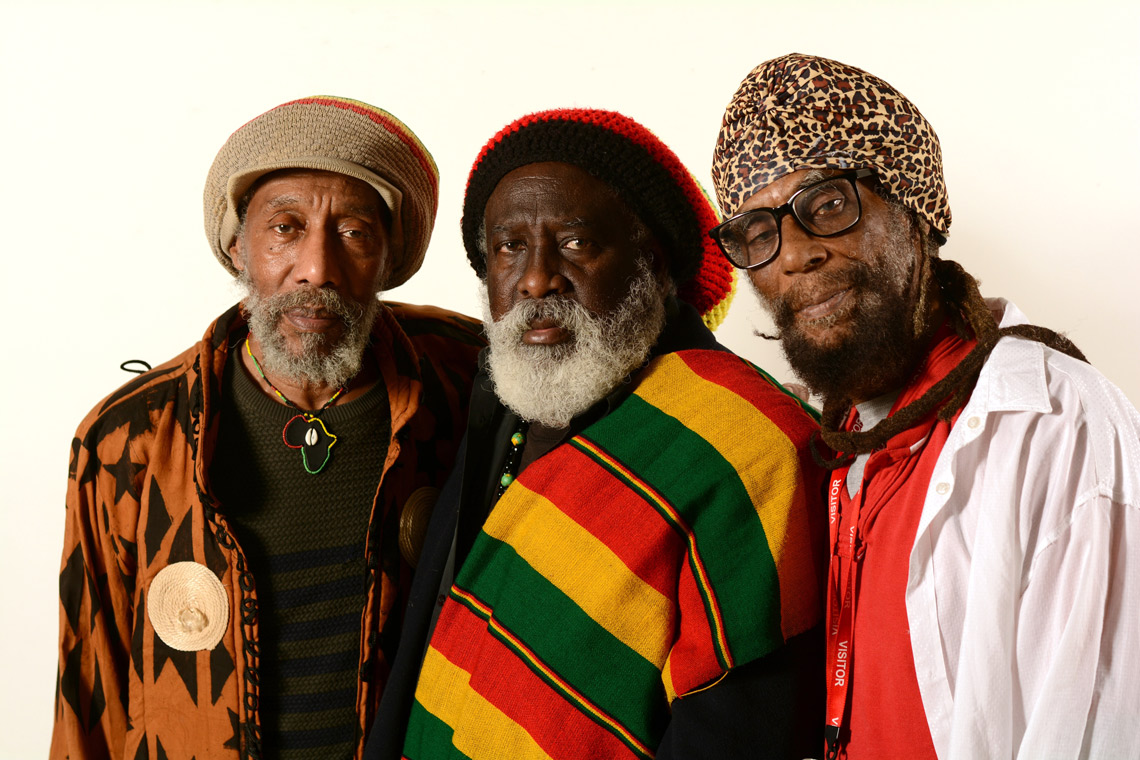
Was it 1967 that the band formed?
Locksley Gichie: it was ’67. But we started performing in about ’68.
How did you start playing live?
So after a while it was all just acoustic until one Saturday Frank said “Come time to get electrical equipment”. So we went to Kilburn again to Melburn, the nice man. And we said “We can't afford all this equipment” but in his back room he had second hand. He said “Come in the back and look” and he showed us this big bass box and said "You can have this one and this guitar you can have it and this keyboard”. So he looked after us. He said “All you've got to do is give me about 50 pence a week”. (laughs) Can you imagine? In those days 50 pence was like £5. So we got the equipment and then it was like learning again. Because from acoustic to live it has different vibes.
But then Maurice and Levy were cricketers. They loved cricket. And because Maurice and Levy loved cricket, the cricket club used to have a dance at the end of every month. And they said “Come and play for us”. At first I didn't want to do it because it was just a pastime hobby. But a certain night we did play live. And it was just a natural vibes you know? What blew people's minds was we were playing the records that they were buying on Friday evening and by Saturday night we'd be on stage playing the same tunes. And if you closed your eyes you couldn't tell the difference. It was so like the original. People went crazy.
And the brethren said we could be residents. Every Saturday night we would play our show. And the place was rammed because people used to come from all over Hackney and all over. Because it was bad, it sounded so much like the record. The first big gig we did was when we did the Ramjam Club. And after Ramjam this guy from Bristol said “There is a guy in Bristol who owns a club. It's good money so go and play there”. So we went to Bamboo Club in Bristol and did Friday, Saturday and Sunday. It was mad! Gosh people couldn't believe it! People were saying “I bought this record this morning and they were playing it live the same night!”. They'd never heard a band do that in England. Actually playing the records that were released.
Sometimes, especially in Leeds because we used to go to the International Club in Leeds. I remember we went there one Friday evening because we were playing for three nights and we did Good Ambition. The people went crazy. They said “I bought this record this morning and they're playing it on stage!” We did the song ten times! Every time we did Good Ambition they said “No, no, one more!” And people were crying! Tears were coming because people couldn't believe they were hearing this record played live and direct. And that was it. The band kicked off from there. The rest is history. We went to Africa after that.
You've talked about it in the documentary but tell us about how the Cimarons got their name.
Locksley Gichie: We thought of a name and we couldn't come up with a name. I used to watch TV every Saturday evening. Bonanza, Laramie, and the Cimarron Strip was a western. But with two Rs. And we were trying to find the name so I just came up with it and said “Cimarrons man!” and everyone said “Yeah, that sounds good”. And then as time went on Levy said “In Spanish it means wild and free”. So that sealed it. Cimarons. Wild and Free. The name stuck.
What was the first session you did?
Locksley Gichie: We told Rodigan that the first producer who took us to the studio was Laurel Aitken. He was the first producer who took us to the studio. And Rodigan asked “What track did you do?” And I said “We did Mr Popcorn”. Rodigan fell off his chair! He says “That's the first record I bought!” Mr Popcorn. And he said “How come I didn't know this?” I said “Because you didn't spend much time interviewing Cimarons!” (laughs)
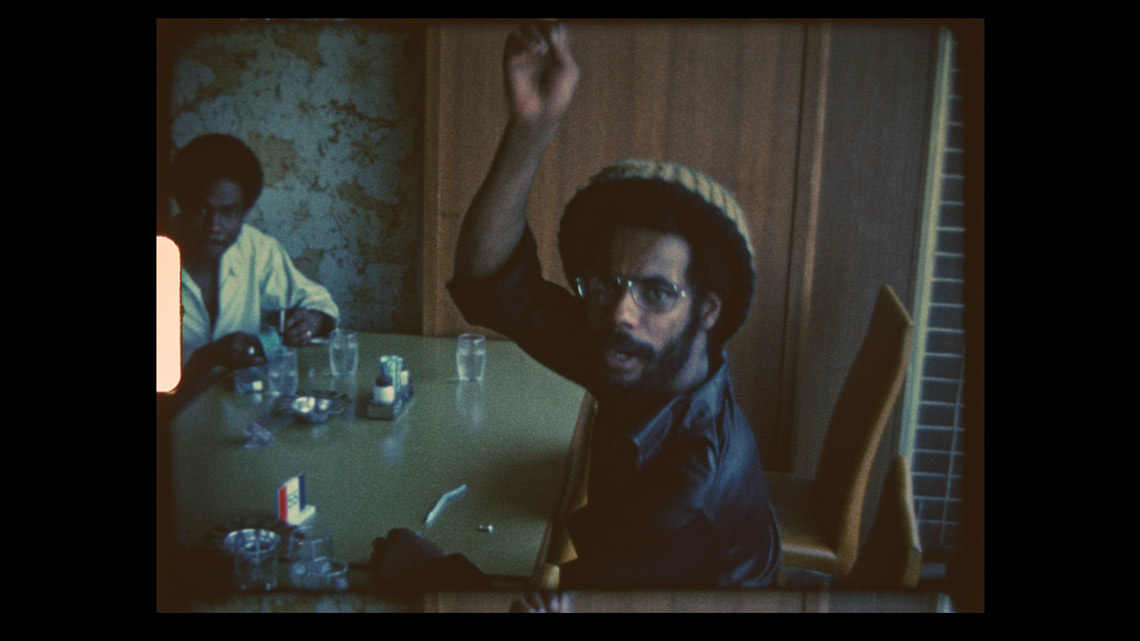
Let's jump back to this pioneering trip to West Africa. Which line-up went out there?
Locksley Gichie: Yeah, that was a good and bad experience. Because what happened was there was this African brother called Eddie Abuma. I think he was from Nigeria or Biafra. We used to rehearse in Stoke Newington, because we used to rehearse in Harlesden but in Harlesden anybody who heard us rehearsing and it became like a dance! The next thing you know it's full! Everybody comes in like a party. So we wanted a bit of freedom and space in Stoke Newington. And this brother came in Eddie and he listened. And he said “I'm looking for a band to take to Africa. Are you guys interested?” At first we thought he was joking but he was serious. He said “No, no, I want a band to take to Africa”. We said “Ok, we don't mind”. And to me Africa I'm seeing the negative part of it. I'm seeing like the jungle and people going around naked and spears! (laughs) That's what goes through my mind!
So we started to rehearse but he said he wanted us to do soul. And we said “But we're a rocksteady band”. So he said “You can do rocksteady too, but concentrate on the soul”. And funnily enough at the time we had a singer called Legs. Because during that time the guitarist Leslie left. He didn't want to know. And Faye, his girlfriend, went with him. And Mingos went to America. So we have this brother called Legs. Legs wasn't a reggae singer he was more of a soul man. And we called him Legs because when he was on stage he was like…
A legs man.
Locksley Gichie: So we decided we would do half an hour of soul and half an hour of reggae. And Eddie brought this record to us and he said “I want you to do this record exactly the way it is”. And the record was The Champ.
The Mohawks.
Locksley Gichie: So he wanted us to do The Champ. And we were thinking “Why?” He said “Don't worry about it, in Africa, soul is the thing. You got to do James Brown”. So we did James Brown Papa's Got a Brand New Bag. We did quite a few soul songs. We did 50/50. Half was rocksteady. We would do rocksteady and then Legs would do the soul. Anyway, he took us to Africa. And he didn't give us much information. When we got to Ghana Airport, coming off the plane we hear a lot of noise (makes sounds of cheering). Me and Frank are walking into the lounge and Frank was saying “It sounds like a big artist is on the plane with us!” We got to the airport lounge and cameras were going flash flash! We were thinking “What's going on? What's happening here?” And they asked us questions. “Which of you are in The Mohawks?” We thought “Mohawks? What you talk about?" The guy told the guy who booked the whole tour that Cimarons bass player and keyboard player were ex-members of the The Mohawks.
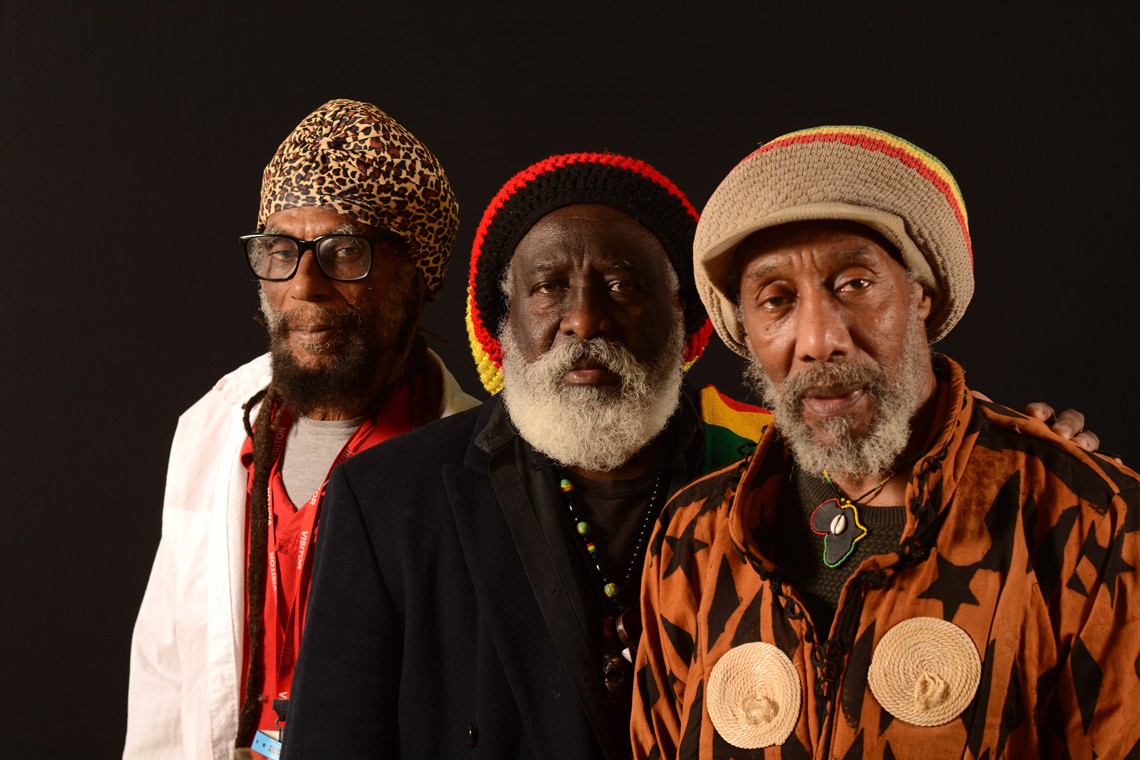
When the keyboardist was really a white man who made TV theme songs, Alan Hawkshaw!
Locksley Gichie: He didn't brief us. We didn't know nothing. And he was going “Ok fellas, let me talk, let me speak”. And he's telling the story saying “This is Carl Levy from The Mohawks and this is Franklyn from The Mohawks”. I said “What's going on here?" and he said “Don't worry about it guys, don't worry about it”. On the way from the airport to the hotel people were lining both sides of the street! We were Superstars! We had kids running behind the bus all the way to the hotel! So we got to the hotel and we stick him up and we said “What's going on Eddie? You could have at least told us before that we are Mohawks?” A soul band.
But we survived it, you know? In England you only do one hour. But in Africa you do two. The first night we played, people went crazy! The soul was good but the rocksteady hit them so hard they couldn't believe what was happening! “What kind of music is this?” But they were loving it! Because of the vibes you know? The first night we did one hour. Coming off stage the club went mad! “More, more!” And we said "No boss, it's finished”. We came off stage and after five minutes the promoter said “Soul Messengers” because they changed our name and we weren't Cimarons anymore. “In Africa you do two hours you don't do one hour". We said “No boss, we do one hour”. After five minutes he says "Fellas if you don't go back on stage, they're going to smash you into bits!” (laughs) “Get back on stage quick, man!”
But after a while we enjoyed it because what happens in Africa is that's how we ended up playing some of our tracks so long. Because when we do a live show you'll notice we do Ship Ahoy and then we'll extend it and that's how it came about. Because in Africa we were doing a song extended. We used to do Papa's Got A Brand New Bag and we probably do it for about 15 or 20 minutes.
Like Fela Kuti. 12 minute songs.
Locksley Gichie: Yeah. We were doing the hotels and thing. And there was this band that used to go on before us called Geraldo Pino. Geraldo Pino used to go on and he would do Cold Sweat for half an hour. And we saw that people loved it. You'd have about 50 people dance for about half an hour until they get hot and sweaty. And then they'd go and sit down. And then the rest would take over. Which was a good vibes. And we were in Ghana for two months. And the tour was sponsored by Ghana Airways. We didn't know that. But the tour was sponsored by Ghana Airways and we decided to go to Nigeria to continue the tour. When we came to take the plane to Nigeria we found out that “You're supposed to go back to England, you're finished here. You can't go to Nigeria. You’re breaking contract”. And everything was on the plane. The equipment and everything was on the plane. And we watched the plane take off to Nigeria without us! He said “You can't leave, you've got to pay some tax, you can't leave nothing here. You can't just do that or your contract is void”.
So we were stranded. We were at the hotel and it was like a house arrest. About two days after, we became very uneasy because we didn't have any clothes or equipment or nothing. And one night about 2am he came to us and said “Fellas, fellas, come take what you've got, take what you've got, come, come”. And he had an 8-seater car, a station wagon waiting for us. And we had to climb over the hotel fence, through the backyard, sneaking out until the main road jumped into this 8-seater and zoom! And we reached Nigeria from Ghana by road! Oh that was an experience! That's a movie by itself.
So just to be clear, had anyone from Cimarons ever played in the session band The Mohawks?
Locksley Gichie: No. It was just made up. He got away with it, but in Nigeria they did get a bit suspicious! (laughs) But it worked out all right but it turned out that he was just a con man. He was saying “Fellas, don't worry, we'll get you your money”. But then when we didn't have the money, he wasn't paying us. The only time we were getting any money was when you sweat! In Nigeria when you sweat they stick money on you! And he told us “Tomorrow night when you go on stage, take off your shirt because when you get sweaty you get more money!” And Fela heard us play the first night. He said “You guys sound good, you must go to my club Afrospot” so we went to Afrospot with Fela and we're getting money there. And this guy was coming on stage and when the money fell off your body he was collecting money. He wanted to steal the money people were giving us!
That was it, man. Eddie did us bad. We left Africa without him. And he said “Don't worry fellas, I'll be back in two weeks time. And I'll pay you”. Two weeks, three weeks, two months can't find Eddie anywhere. He did disappear! Vanish. We did find him. But what saved us really was the equipment. We didn't want to leave Nigeria with the equipment because it cost extra weight. And there were some people there that wanted to buy the equipment from us. My guitar was only £15. I sold it for 180! (Laughs) The drum? £100! But what happened was they gave us a cheque. They paid in cheque. We came back to London. We couldn't find Eddie but we got no equipment and we want to work. So after a month we decided we would get a job. To get some more money to get the equipment. We started to work at Coca-Cola! (laughs) And in those days the cheque took a long time to change. You put a cheque in the bank and it would take about two months before it would change. So after one month we say “Oh no. It's a bouncer”.
But after about six weeks Frank came and said “Yo, come!” We're working now in the Coca-Cola factory, packing crates. And Frank came on Thursday and said “Come!” I said “What happened?” He says “Come just, follow me”. And when we look, he got the money changed from the bank. And we just walk off the job. Just walked off. And the foreman said “Hey, you can't do that! You can't leave a job like that!” This is 1970 now. And we went up to Melburn who looked after us and we got the best. We got the best of the best. In those days it was a Fender guitar. Frank got a Gibson bass. Maurice got a Hayman drum. Levy got a Farfisa organ. We got the best equipment back then. And that was it. We started backing Pat Kelly. And we inspired so many people. We inspired everyone. Every guitarist used to buy a Fender. And every bassist had a Gibson. And from there, after Pat Kelly, Ken Boothe. After Ken Boothe, Toots and the Maytals, the Pioneers, Slim Smith, Alton Ellis, we did the lot.
So who was the first official Cimarons vocalist?
Locksley Gichie: It was Carl. Carl Lewis. Carl came along at the same time that we did Morning Sun. When we were recording with Philip Chen. That's when Carl came along because Philip knew Carl. And he brought him in to do some songs. Carl sounded good, man. And when we did a cover version of Oh Me Oh My and it sounded so wicked! But he didn't do it for us, he did it for Phil. Because a couple of years later I saw it turn up on Columbia label.
Because we didn't have a vocalist. I was doing the singing. And then the rest of the band decided that we should have a vocalist. Because it's too much work for me alone. So I said “I don't mind, I'll do the backing vocals and thing”. And so Carl Bert came in. A few years before we started to do the In Time album. Because we did Oh Mammy Blue produced by Dandy Livingstone, that was the first single. And we did quite a few more singles with Carl Bert. And Carl Bert became very popular. Producers wanted to record Carl Bert. Clement Bushay. You name it, everybody wanted to record Carl Bert! (laughs) But Carl Bert didn't last very long because after two years Carl Bert left.
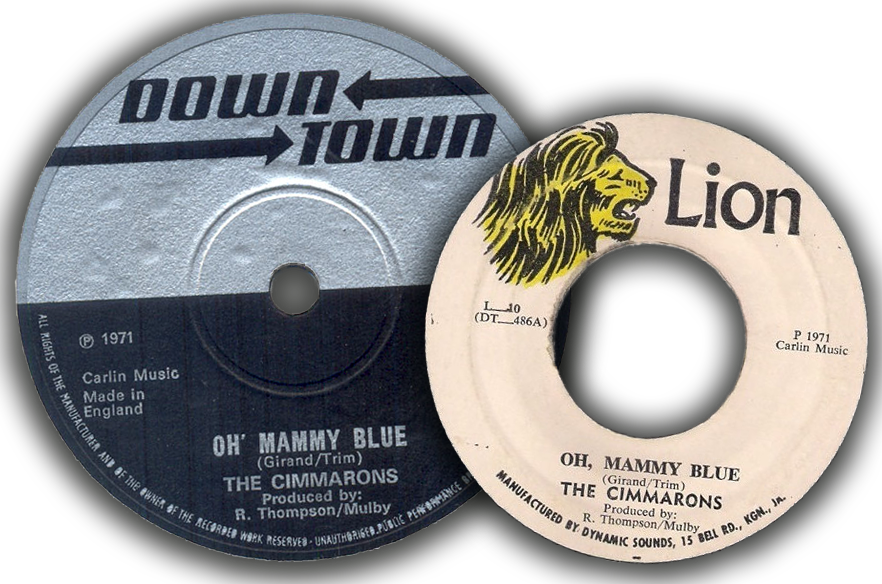
What happened?
We had some dispute. We had some argument. Him and Frank were always arguing. And funnily enough we had just started to do the In Time album and we had gigs to do in Ireland. It was the first time in Ireland. In about ’73. Carl Bert was always in the bookshop. He loved gambling. He went in the bookshop and he must have won some good money. We were rehearsing to go to Ireland and Carl Bert didn't turn up. He wasn't at the rehearsal so we tried to phone him and he told us to piss off didn't he? Because he won the money! It must have been like £5,000 or something like that. So we needed a vocalist because he left. He sacked himself. He and Franklyn were always arguing anyway. Good friends you know? Even now… but always arguing!
And at the same time we were doing a lot of backing band things. We were backing Pat Kelly. Doing a tour and there was a big Festival at this big name club in Birmingham. And everybody was there, Dennis Alcapone, you name it, everybody was at this big festival at the time. We did our set with Pat Kelly, went up to the dressing room and we heard this voice! Sings “Oh cherry oh cherry oh baby". “Who that? It sounds like Eric Donaldson! We haven't heard that he was on the show. We heard that he was in Jamaica”. So we said “Who that?” So then we heard Dennis Alcapone's voice come in, because that was his version.
Ripe Cherry.
Locksley Gichie: So we went downstairs and we saw this skinny little guy on stage! We said “What? This sounds like Eric Donaldson". So after the show we asked him "You sound good, you know? What's your name?” He said “Winston”. We said “Come to Kilburn next week and we can have a talk”. And he was there. He turned up on Friday evening at HQ. In Queens Park. And we said to him “We would like you to sing with Cimarons". He couldn't believe it! He said “What? Cimarons, yeah man!" At the time we were doing Pat Kelly. And that was a boom. Cimarons backing Pat Kelly was like the original sound. It sounds just like the record. And that was it. Winston joined the band. Because before he was singing with a band called 90 Degrees. When Winston joined the band we were halfway through the In Time album. Because Carl Bert already started. So we just threw him in the deep end. He finished off the In Time album and he did a very good job too. So Winston got in and Winston was with us for all these years. Until Michael Arkk!




